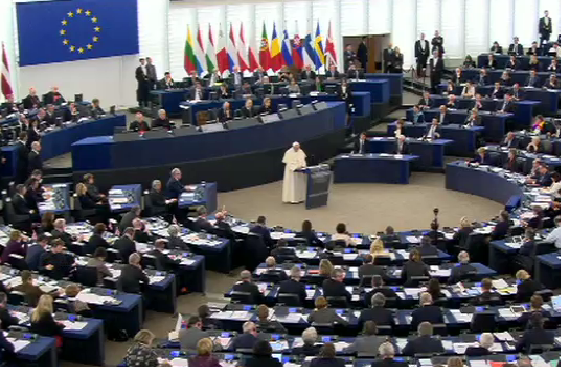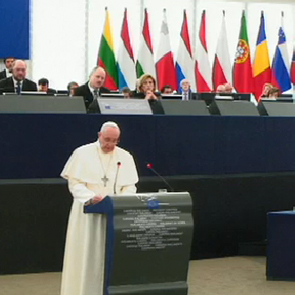Pope Francis reminded the European Parliament and the Council of Europe today of the need to put the dignity of the human person at the heart of their work.
He received a standing ovation for his at times hard-hitting address to MEPs who at several points burst into applause. He addressed the Council Europe shortly afterwards as the second part of his whistle-stop trip to Strasbourg.
He told MEPs that since Pope John Paul II addressed the EU Parliament in 1988 the world had become less Euro-centric, and the continent “seems to give the impression of being somewhat elderly and haggard”.
He continued: “In many quarters we encounter a general impression of weariness and aging, of a Europe which is now a "'grandmother', no longer fertile and vibrant.”
He urged the EU to “return to the firm conviction” of its founders, who envisaged a peace project build around a vision of man not as an economic unit but as “persons endowed with transcendent dignity”.
 “Appreciating its religious roots" would help Europe to make itself “all the more immune to the many forms of extremism spreading in the world today, not least as a result of the great vacuum of ideals which we are currently witnessing in the West,” he said.
“Appreciating its religious roots" would help Europe to make itself “all the more immune to the many forms of extremism spreading in the world today, not least as a result of the great vacuum of ideals which we are currently witnessing in the West,” he said.
Francis mentioned “Christians in particular” in countries such as Iraq and Syria, who are sold into slavery and even beheaded or crucified “under the shameful and complicit silence of so many”.
He warned MEPs not to forget the religious roots of the European project. “A Europe which is no longer open to the transcendent dimension of life is a Europe which risks slowly losing its own soul and that 'humanistic spirit' which it still loves and defends,” he said.
Developing the theme of human dignity, and linking it to concerns about abortion and euthanasia, he said:
“There are still too many situations in which human beings are treated as objects whose conception, configuration and utility can be programmed, and who can then be discarded when no longer useful, due to weakness, illness or old age.”
He expressed concern at economic inequality, rooted in “certain rather selfish lifestyles, marked by an opulence which is no longer sustainable and frequently indifferent to the world around us, and especially to the poorest of the poor.”
He talked of a need to restore dignity to labour by ensuring “proper working conditions” that balanced market flexibility with the need for stability and job security for workers and created an environment suitable for raising families.
Francis also called for a united response to the plight of immigrants desperate to reach Europe’s shores. “We cannot allow the Mediterranean to become a vast cemetery!” he said, calling for “fair, courageous and realistic policies” to assist the countries of origin to resolve their conflicts, and legislation to protect the rights of European citizens while ensuring the acceptance of immigrants.
The Pope concluded by encouraging Europe to rediscover the best of itself: “Dear Members of the European Parliament, the time has come to work together in building a Europe which revolves not around the economy, but around the sacredness of the human person, around inalienable values. In building a Europe which courageously embraces its past and confidently looks to its future in order fully to experience the hope of its present … A Europe which contemplates the heavens and pursues lofty ideals. A Europe which cares for, defends and protects man, every man and woman. A Europe which bestrides the earth surely and securely, a precious point of reference for all humanity!
In his address to the Council of Europe shortly afterwards, he told members that to establish and maintain peace required education, the banishment of a culture of conflict and ending the marginalisation of “those who think of live differently than ourselves”.
Pope Francis commended the Council’s work upholding human rights but lamented the way that religious and international terrorism “is unfortunately bankrolled by a frequently unchecked traffic in weapons”. He warned that human trafficking had become “the new slavery of our age”.
He cautioned that in order for Europe to keep progressing it needed a “profound” sense of its past. He also warned against an “individualistic conception” of human rights that would lead to “human impoverishment and cultural aridity”.
And he highlighted the high levels of youth unemployment, likening them to “a veritable mortgage of the future”.
Read the full text of Francis' address to the European Parliament here.
Read the full text of Francis' address to the Council of Europe here.




 Loading ...
Loading ...